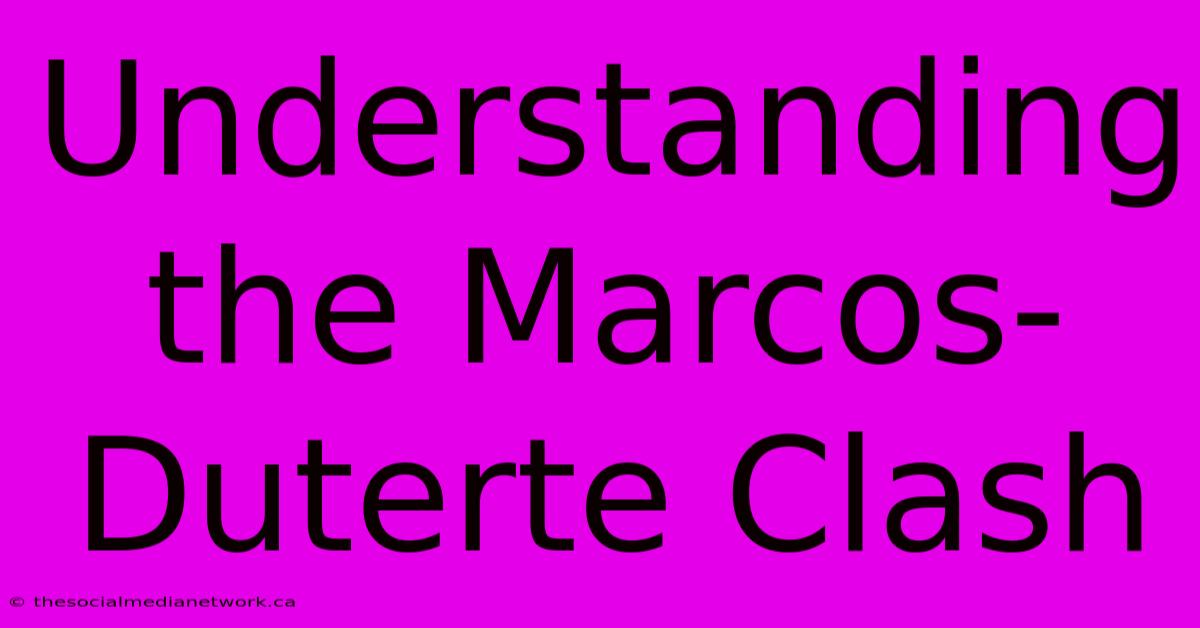Understanding The Marcos-Duterte Clash

Discover more detailed and exciting information on our website. Click the link below to start your adventure: Visit Best Website meltwatermedia.ca. Don't miss out!
Table of Contents
Understanding the Marcos-Duterte Clash: A Deep Dive into Philippine Politics
The Philippines has a vibrant and often complex political landscape. Nowhere is this more evident than in the evolving relationship between the Marcos and Duterte families, two political dynasties that have profoundly shaped the nation's history and trajectory. While initially appearing as an alliance, the dynamic between them has become increasingly nuanced, marked by both cooperation and subtle (and sometimes not-so-subtle) conflict. Understanding this "clash" requires examining their shared history, diverging interests, and the broader political implications for the Philippines.
The Roots of the Alliance: Shared Goals and Strategic Partnerships
The partnership between the Marcos and Duterte families wasn't born out of personal affection, but rather a convergence of political pragmatism and shared ambitions. Both families represented powerful political machines with significant regional influence. Their alliance, solidified during Bongbong Marcos's successful 2022 presidential campaign with Sara Duterte as his running mate, capitalized on:
- Consolidation of Power: Both aimed to consolidate power at the national level, building upon the existing influence they wielded in their respective regions. This alliance allowed them to effectively neutralize potential opposition and maintain control.
- Legacy Building: For the Marcoses, the presidency represented a chance to rehabilitate their family's image after the decades of controversy surrounding the Marcos regime under Ferdinand Marcos Sr. For the Dutertes, it extended their political dominance beyond Davao City and solidified their place in Philippine political history.
- Shared Political Base: Both families tapped into a similar voter base, appealing to a segment of the population seeking strong leadership and a decisive approach to national issues. This overlap in their constituencies strengthened their combined power.
The Emerging Cracks: Diverging Interests and Policy Differences
Despite the initial show of unity, fissures have begun to appear in the Marcos-Duterte alliance. These discrepancies stem from:
- Differing Policy Priorities: While both favor a strongman approach to governance, subtle differences in their preferred policy approaches have emerged. This is particularly visible in economic policy and foreign relations.
- Competition for Influence: The competition for control within the administration is a delicate balancing act. The powerful political machines of both families inevitably clash over appointments, resource allocation, and policy decisions.
- Succession Politics: The looming question of succession for the 2028 elections inevitably adds another layer of complexity. Both families are likely to strategize for maintaining or increasing their influence in the future political landscape.
Specific Instances of the Clash:
Several key events highlight the tensions brewing within this alliance. For example, differing opinions on:
- The handling of the West Philippine Sea dispute: subtle variations in approach toward China suggest diverging priorities.
- Economic reforms: There have been whispers of disagreement on the pace and direction of economic development, reflecting the different priorities of their respective political bases.
- Appointments and key positions: Certain appointments have hinted at a power struggle within the administration.
The Implications for the Philippines
The dynamics between the Marcos and Duterte families have significant implications for the Philippines' political, economic, and social future. These include:
- Political Stability: The potential for further clashes could destabilize the political system.
- Economic Development: The interplay of differing economic visions could impact the country's trajectory.
- Foreign Relations: The nation's foreign policy could be affected by the subtle shifting alliances.
- Public Perception: The public's perception of the government's legitimacy and effectiveness is at stake.
Conclusion: A Shifting Landscape
The relationship between the Marcos and Duterte families is a crucial element in understanding contemporary Philippine politics. While the alliance initially appeared strong, the emergence of diverging interests and subtle power struggles suggests a more complex and potentially volatile dynamic. The future trajectory of this relationship will undoubtedly shape the Philippines for years to come. Ongoing observation and analysis are crucial to fully grasp the implications of this ongoing political interplay. This is not a simple clash of personalities, but a battle for the future direction of the Philippines.

Thank you for visiting our website wich cover about Understanding The Marcos-Duterte Clash. We hope the information provided has been useful to you. Feel free to contact us if you have any questions or need further assistance. See you next time and dont miss to bookmark.
Featured Posts
-
Philippines President On Vp Assassination Attempt
Nov 30, 2024
-
Pdrm Fc Eyes Nsfcs Resurgence
Nov 30, 2024
-
Piala Malaysia Update Negeri Sembilan In Quarters
Nov 30, 2024
-
First Of 20 A330neos Leased To Malaysia Airlines
Nov 30, 2024
-
Kl Rovers Match Jdts Undistracted Focus
Nov 30, 2024
